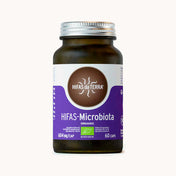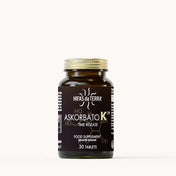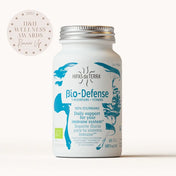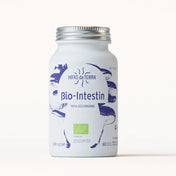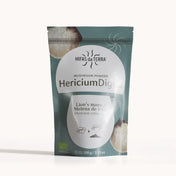Menopause and Symptoms: How to Manage This Life Transition Naturally

Menopause is a significant life transition that brings hormonal changes, impacting both physical and mental well-being. From hot flashes and weight gain to itchy skin and hair loss, many women experience a wide range of symptoms. But what exactly are the signs of menopause, how long do they last, and what natural remedies can help ease the journey?
This guide explores the key menopause symptoms and provides natural solutions to support your body during this phase.

Understanding Menopause and Its Stages
Menopause is diagnosed when a woman has gone 12 consecutive months without a menstrual period. However, the process happens in stages:
- Perimenopause (the transition phase) – Can begin up to 10 years before menopause, with fluctuating hormone levels causing irregular periods, mood swings, and hot flashes.
- Menopause – The point when menstruation stops entirely due to declining estrogen and progesterone.
Postmenopause – The phase after menopause, where symptoms may continue for several years but often become less intense.
What Are the Symptoms of Menopause?
Each woman’s experience is different, but common menopause symptoms include:

1. Hot Flashes and Night Sweats
One of the most well-known signs is, menopause hot flashes cause sudden warmth in the face and upper body, often followed by sweating. These episodes can occur during the day or at night, disrupting sleep.
Natural relief: Cooling techniques, loose clothing, and stress management can help reduce their intensity.
2. Mood Changes and Anxiety
Hormonal fluctuations affect neurotransmitters in the brain, leading to menopause mood changes, increased anxiety, irritability, or even depression.
Natural relief: Adaptogenic mushrooms like Reishi may help support emotional balance and resilience to stress.
3. Menopause Fatigue
Low energy levels are common due to hormonal shifts, poor sleep, and increased stress levels.
Natural relief: A diet rich in B vitamins, magnesium, and adaptogens like Cordyceps can help combat tiredness.
4. Menopause and Weight Gain
Metabolic changes make it easier to gain weight, particularly around the abdomen. This can also increase the risk of insulin resistance and heart disease.
Natural relief: Regular exercise, strength training, and a balanced diet focusing on protein and healthy fats can support metabolism.
5. Hair Loss Due to Menopause
Estrogen supports healthy hair growth, so declining levels can lead to thinning hair or increased shedding.
Natural relief: Scalp massages with essential oils and a diet rich in biotin, zinc, and omega-3s may help.
6. Menopause Itchy Skin
Lower estrogen levels can reduce collagen and skin hydration, leading to dry, itchy, and irritated skin.
Natural relief: Hydrating from within with collagen-boosting foods, drinking plenty of water, and using natural moisturizers can help.
How Long Do Menopause Symptoms Last?
On average, symptoms can persist for four to five years after the last period, though some women experience them for a decade or more (source: NHS UK).

Natural Approaches to Managing Menopause Symptoms
1. Adaptogenic Mushrooms for Hormonal Balance
Certain mushrooms contain bioactive compounds that may help support the body’s response to hormonal fluctuations and stress.
- Reishi Mushroom – Known as the “mushroom of longevity,” it may aid with stress management, sleep quality, and mood balance.
- Lion’s Mane – Traditionally used to support cognitive function, memory, and mood stability.
2. Nutrition for Menopause Weight Gain & Energy Levels
A well-balanced diet plays a crucial role in managing menopause symptoms:
✅ Increase protein intake – Helps maintain muscle mass and metabolism.
✅ Eat healthy fats – Omega-3s (found in flaxseeds, walnuts, and fish) support brain health and inflammation reduction.
✅ Avoid sugar spikes – Stabilizing blood sugar can help prevent energy crashes and mood swings.
3. Exercise to Combat Fatigue & Support Bone Health
Weight-bearing exercises like yoga, Pilates, and resistance training can:
💪 Prevent osteoporosis
💪 Boost metabolism and help with weight management
💪 Improve mood and energy levels
4. Lifestyle Adjustments for Better Sleep & Hot Flash Relief
- Cooling techniques: Use breathable fabrics and cooling pillows.
- Mindfulness & Relaxation: Practices like meditation and deep breathing help reduce stress-related hot flashes.
Consistent sleep schedule: Going to bed at the same time each night supports hormonal balance.
The Power of Natural Support During Menopause
Menopause is a journey, not an endpoint. While hormonal changes can bring discomfort, taking a holistic approach with nutrition, lifestyle changes, and adaptogenic mushrooms can ease the transition.
Looking for natural menopause support? Browse our supplements here to discover solutions designed for hormonal balance.
WE RECOMMEND

The science behind Ashwagandha: properties and benefits for women
Table of Contents What is ashwagandha and why is everyone talking about its properties? Ashwagandha or sleep berry, has earned a top spot among natural

How to Obtain More Energy and Fight Fatigue Naturally
If you’ve been feeling mentally and physically exhausted, struggling to focus, or asking yourself, Why am I so fatigued?, you’re not alone. Fatigue is a



